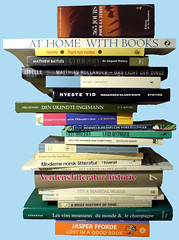Slow Reading
Wednesday, September 30, 2009
Slow Reading
by John Miedema, 2009You should know
This is another book I got from LibraryThing's Early Reviewer program.I tend to be a pretty fast reader.
So?
This book is actually a series of four essays that were written toward the author's Master's degree. His premise is that reading slowly allows one to consider the book in question slowly, and absorb its content more easily.Slow reading is traced back to biblical metaphors in which prophets and apostles are instructed to eat books. The author also notes that even when slow, close reading is promoted, it's in a somewhat elitist, academic way, not mentioning that a close read of a good book can, in fact, be quite pleasant.
The author also goes on about how the Internet is training us to scan what we read, rather than to absorb it. This is actually not a bad point, but unfortunately, the text of the book is academic enough that I repeatedly found myself scanning it, not absorbing it. If you want to convince me to read in more depth, write something I want to read in more depth.
I really don't like how the citations are done in this book. I typically appreciate footnotes and end notes, but there were cases where I was curious as to a source that was being cited, only to have a hard time finding it in the end-notes (and, in one case, noting that a cited author's name was misspelled).
To elaborate, when another writer or scholar's work is cite, the author merely gives the last name and page number; it is up to the reader to go to the end-notes and find out who, for example, "Pike" is, what book page 161 falls in, and why, exactly, we should care. I grant you that this method slowed my reading of the book, but the only deep thinking it inspired was how annoyed I was at not knowing who on earth he was referencing.
Don't tell me, "According to Smith (150)..." There are millions of Smiths and I don't see why I should take any of them seriously. Tell me, "According to Jane Smith, Head of Whatever Studies at Random University..." OK, the lady's an expert. Now you've got my attention.
Also, the manuscript could have done with one more edit. After all, on page 25, he notes:
Schillingsburg (2006) observes that 99% accuracy in scanning means an error in every 100 letters, spaces and punctuation marks. "Would we be fatally injured if the word was 'celebrate' not 'celibate' or if the word 'no' is occasionally left out" (21)? Yes, I think. A single typo on a resume will cost an applicant a chance at a job interview.
Typo karma. I'm not immune; there's no doubt in my mind that there's at least one typo in this review. But no one is being paid to read this before it goes live. And someone should have check that when he cites, for instance, "Gaiman, 2008," the endnote doesn't refer to "Gainman, N. (2008). The results of free. Retrieved from http://journal.neilgaiman.com/2008/07/results-of-free.html." Emphasis mine. If you're wondering, the correct spelling is "Gaiman".
Rating
Skip it, most likely...It's got some interesting thoughts, but unless this is specifically your area of interest, you're probably not going to get a lot out of it.
The rest of the Internet
The Wikipedia page for the concept of slow reading.The author's blog.
The author's page and book's page on LibraryThing.
The book is reviewed at Library Alchemy.
Mary at the 999 Challenge reviews the book.

![Reblog this post [with Zemanta]](http://img.zemanta.com/reblog_c.png?x-id=0ffa4786-55bd-4c7e-80b0-ae4daa1e666b)